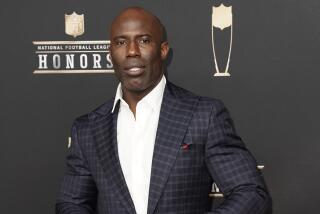HIV-Infected Laguna Pilot Sues Airline
- Share via
Two United Airlines pilots, one of them from Laguna Beach, said Tuesday that they have filed an employment discrimination lawsuit against the airline, alleging that United forbade them from flying because they have HIV, the virus that causes AIDS.
Paul H. Rafalowski, 33, of Laguna Beach worked for the airline for nine years, piloting 737s in the continental United States before he was told to retire last June, said Peter F. Laura, a lawyer for both pilots in Beverly Hills.
“He’s been devastated by the whole ordeal,” Laura said of Rafalowski, who could not be reached for comment. “It’s really having a significant negative impact on him, to have his career taken away from him.”
Laura and some AIDS groups said it appears to be the first such case filed by commercial airline pilots under the Americans With Disabilities Act, which went into effect in 1992.
The case extends the already-sensitive subject of AIDS in the workplace to another group of professionals whose jobs include protecting the safety of others. Similar cases have touched on the medical and dental professions.
United maintained that in the interest of passenger safety, it acted properly in grounding the pilots under rules set by the Federal Aviation Administration.
The pilots’ suit was filed Friday in U.S. District Court in Los Angeles by Rafalowski and R. Christopher Prilliman, 38, of Dallas. It has since been transferred to federal court in Santa Ana.
It alleges that after United learned they were HIV-positive, the pilots were grounded despite passing medical examinations given by United and the FAA earlier in 1994.
Prilliman and Rafalowski “shouldn’t have been disqualified and were capable of effectively and safely flying,” Laura said.
Rafalowski became ill with a nerve disorder in December and is now confined to a wheelchair, Laura said.
But last year, Laura said, his client was healthy. According to Laura, Rafalowski passed a UAL medical exam last April and passed an FAA medical exam on June 10. But a United Airlines doctor had some questions about Rafalowski’s blood tests and called the pilot’s personal doctor.
“In the course of that discussion, Paul’s doctor told (the UAL doctor) that Paul was HIV positive,” Laura said. “On that point, on or about June 11, 1994, he was informed that he would be forced to retire from his position. His medical retirement became effective on June 24, 1994.”
The suit does not yet request a specific amount of damages, he added.
Laura said he believes Rafalowski’s depression after his retirement may have caused his health to deteriorate more quickly than it otherwise would have.
“It may be that without the stress from the separation he might have been healthier longer,” Laura said.
United, a unit of UAL Corp. in suburban Chicago, is the nation’s largest airline. Its pilots, like all others, must have a medical certificate from the FAA to fly.
UAL’s medical director, Dr. Gary Kohn, said the airline received information from the pilots’ doctors last year “that led us to believe they had a disqualifying condition” under FAA standards.
He declined to be more specific.
“Since my priority as the flight surgeon is to ensure the safety of passengers and pilots, if I know a pilot has a condition that would disqualify him, then I have to restrict his flying duties until he’s qualified,” Kohn said in a telephone interview. Kohn also said the pilots were not fired, but rather placed on long-term disability, under which they receive 55% of their salaries and certain benefits.
A key issue in the case may be how far advanced the condition was.
FAA spokesman Hank Price declined comment on the case but said that being HIV-positive alone does not preclude a pilot from being approved. “A diagnosis of AIDS by internationally accepted criteria is considered a basis for denial” of an FAA medical permit, he said.
Laura said both pilots had AIDS at the time, but neither were sick enough to be grounded under FAA policy. That policy allows grounding only if a pilot has an opportunistic infection and or is taking anti-viral drugs, Laura said, and neither pilot fit that definition.
Jeff T. Monford, director of the workplace resource center for the National Leadership Coalition on AIDS in Washington, said the pilots’ case illustrates how AIDS now affects an occupation whose leaders generally have been unwilling to deal with the issue. Pilots have taken a misguided “macho” attitude toward AIDS, treating it as “not an issue for pilots, but for the support staff,” he said.
“Maybe a good thing that comes out of this is that they’ll finally be willing to look at this issue,” Monford said. The suit was filed in Southern California because that is where the pilots were told of United’s decision, Laura said.
Times staff writer Lee Romney contributed to this story.
More to Read
Inside the business of entertainment
The Wide Shot brings you news, analysis and insights on everything from streaming wars to production — and what it all means for the future.
You may occasionally receive promotional content from the Los Angeles Times.











